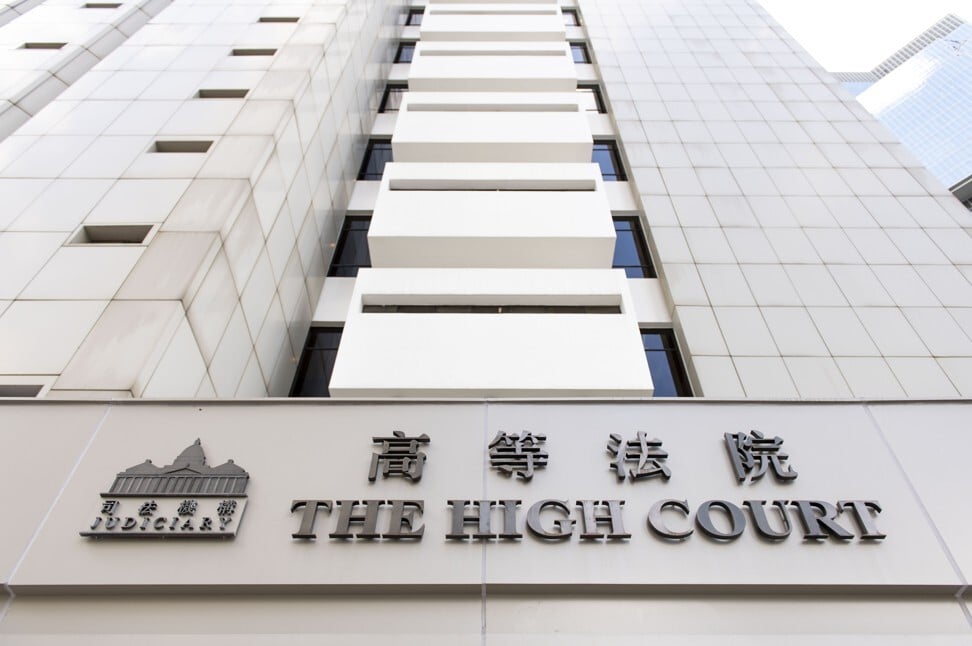
Bittersweet day for Hong Kong LGBT community as court rules in favour of inheritance rights between gay couple, but rejects foreign same-sex marriage bid
- Gay homeowner Edgar Ng wins case to allow husband to inherit estate
- Activist Jimmy Sham loses legal challenge for city to recognise foreign same-sex marriages
Hong Kong’s High Court ruled in favour of a gay homeowner seeking equal inheritance rights for his partner, but rejected a bid to recognise foreign same-sex marriages in a bittersweet day involving two important judgments on the rights of sexual minorities in the city.
Mr Justice Anderson Chow Ka-ming ruled on two separate cases on Friday, a year after he concluded the government had no positive obligation to provide an alternative legal framework for equal treatment as it was not unconstitutional to deny same-sex couples their right to marriage.
Activist Jimmy Sham’s lawyers urge court to recognise his same-sex marriage
Ng, who was not in court on Friday, had applied for judicial review out of concern that his husband would not be able to inherit his estate in the absence of a will or other estate planning because their union in London was not considered a valid marriage in Hong Kong.
His husband, Henry Li Yik-ho, said they were very happy and excited about the victory as the court had ruled they could not be treated differently, but added that the case was only their first step and there could be more to follow as the law affected every aspect of life.
“It’s very tiring, we have mounted two challenges just for our home,” Li said, referring to his husband’s other bid for cohabitation in their government-subsidised flat, which had not yet been scheduled for substantive hearing. “I hope the government will take the initiative to ensure that all laws are constitutional.”
Campaign group Hong Kong Marriage Equality (HKME) said Ng’s case was an important victory, serving as “a clear signal to society that unequal treatment of same-sex couples is not justified”.
But the group also expressed disappointment with the outcome of the broader challenge from activist Jimmy Sham Tsz-kit, saying the court had “missed its chance to advance the legal status of overseas married same-sex couples”.
“Hong Kong aspires to be a leading world city in the world but we are dragging our feet when it comes to LGBT+ equality,” the HKME statement added.
Sham, the Civil Human Rights Front convenor, lost his bid for a general declaration that Hong Kong laws violated the constitutional right to equality when they recognised foreign heterosexual marriages but not homosexual ones, such as his, registered in New York.
In the Ng case, the judge ruled there was an unjustified differential treatment accorded to same-sex married couples dealing with legal entitlements and benefits relating to inheritance, which constituted unlawful discrimination on the grounds of sexual orientation.
He also recognised that many of the government’s current policies and statutory provisions were “vulnerable to challenge” on the same grounds and might be held unconstitutional upon analysis.
But he found Sham’s attempt to achieve complete parity of legal recognition “too ambitious” and “fundamentally flawed” when the basic question of whether there was differential treatment “cannot be answered in a vacuum”, without subject matter or context, which Hong Kong’s top court had ruled as a “crucial” consideration.
For instance, opposite-sex and same-sex couples were not in a comparable position when it came to divorce, as it was a remedy limited to parties in a valid marriage under Hong Kong law.
There could also be other instances where it would be appropriate to confine certain rights or benefits, or accord differential treatment to opposite-sex couples, such as in circumstances relating to biological or child-related issues.

Chow further observed that Sham was essentially contending that the status of marriage was generally open to couples of the same sex provided that they were lawfully married according to the laws of the place where the marriage was celebrated, when the Court of Final Appeal had already affirmed the definition of marriage as heterosexual.
“There cannot be a general rule applicable in all circumstances,” Chow explained. “It remains open to the applicant to challenge any particular decision (including a matter of policy or a statutory provision) which accords differential treatment based on sexual orientation as a violation of his constitutional right to equality.”
In the case of inheritance, Chow said the differential treatment was unjustified because it was not rationally connected to any legitimate aims identified by the government, which included supporting the integrity of the traditional institution of marriage and encouraging heterosexual couples to marry.
Outside court, Sham called Chow’s rulings ridiculous and lacking in courage for not correcting the systemic discrimination he recognised in one go.
“They won’t sell you the entire strip of barbecue pork – but once chopped in pieces they’ll let you purchase one by one,” Sham said.
“Why should we homosexuals have to mount 10, or 100 judicial reviews, to fight for the rights that we are entitled to? This approach in itself is unjust.”
Sham said he would consult his lawyers on whether to appeal.
Gay homeowner sues Housing Authority over husband cohabitation ban
Parties in Ng’s case have 21 days to formulate a remedial interpretation for terms such as “valid marriage”, “husband” and “wife” under the Intestates’ Estates Ordinance and the Inheritance (Provision for Family and Dependants) Ordinance.
His lawyers had previously suggested that “husband and wife” shall be read as “a married person and his or her spouse”.
Asked if the government would appeal, a spokesman said the Home Affairs Bureau respected the court ruling.
“We will carefully consider the judgment and seek legal advice from the Department of Justice … before deciding on the corresponding follow-up actions,” he said.

